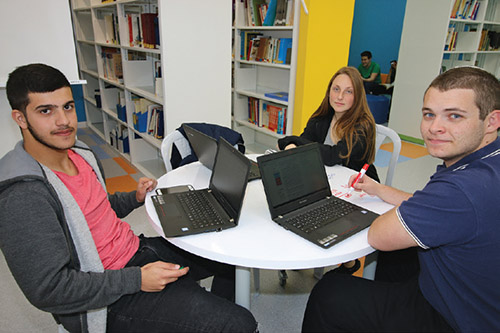
(Courtesy of AMIT) Israel—Studying for the bagrut exams is a rite of passage for most Israeli teens, as they know it will pave the way for their path to higher education. Many study on their own or with friends, some hire private tutors while every year about 6,000 Israeli teens get assistance through a virtual program called Nachshon.
The program, which is run by the Education Ministry in cooperation with the Center for Educational Technology, employs about 1,000 educators—outstanding university students and young teachers—to prepare the high school kids for their matriculation exams in math, science and English. At least two of those educators have a connection to AMIT.
One of them is Frederick Sherman, an alumnus of the AMIT high school in Beersheva, who is now studying computer science at Ben-Gurion University. The other is Jana Kowarsky, who studied biochemical engineering and worked as an engineer at a biotech firm but left that career to become a teacher at AMIT Sderot Gutwirth Junior and Senior High School.
Both said that Nachshon gives them a sense of purpose and enables them to give back to society, a core value that AMIT stresses.
Sherman first heard of Nachshon as a sophomore in high school. “The program enabled me to understand the material at a deeper level, and provided the best conditions for studying—frequent meetings with the same person over the course of the year, someone who cared about me, who could tell when I was having a hard time and called to check in when necessary,” said Sherman, who scored 100 on his level 5 math bagrut. “Today, I’m the one who calls my students when they are having a hard time.”
Kowarsky also finds it rewarding to help students on a weekly basis, as she has done for several years. When she was working as a biochemical engineer, she said, “The weekly meetings with my students were what I anticipated all week. I prepared for them and couldn’t wait to teach. I realized that if I’m at work and looking forward to doing something else all day, then something’s not right.” Soon after, she took a job teaching at the AMIT school in Sderot.
Sherman, for his part, says he works with students across the country—new immigrants who barely speak Hebrew, teenagers who came to Israel alone as part of the Naale program and others. “I know that what I am doing truly has an impact on them,” he said.









